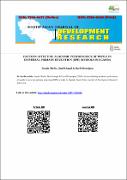Factors affecting academic performance of pupils in universal primary education (UPE) schools in Uganda
Abstract
This study focused on factors affecting the academic performance of
pupils in UPE schools since pupils are central in the educational
process. Four questions were answered, namely: what is the effect of
institutional leadership on the performance of pupils in UPE schools?
What effect do political factors have on the performance of pupils in
UPE schools? What effect do socio-cultural factors have on the
performance of pupils and how does parents’ involvement affect the
performance of pupils? Secondary data were analysed using a
document review analysis and it is revealed that school leaders such as
school management committees and the head teachers who are
equipped with leadership skills have an effect on the academic
excellence of pupils; political factors exhibited through fulfilment of
responsibility from the state and the district authorities affect academic
performance of pupils in UPE schools. However, lack of government
commitment, in terms of limited allocation of resources to schools in
rural areas affects the performance of learners. Finally, selected
cultural factors such as gender preference, early marriages, unplanned
pregnancies, child labour and female genital mutilation (FGM) have a
negative impact on the performance of pupils in UPE schools.
Therefore, the involvement of parents in facilitating education of their
children is presented as a contributory factor in attaining better
academic performance in UPE schools. It is recommended that parents
should participate in key school activities such as meetings with
teachers.
Collections
- Research Articles [139]

